Iran Unveils Soleimani Statues In Cuba, Nicaragua
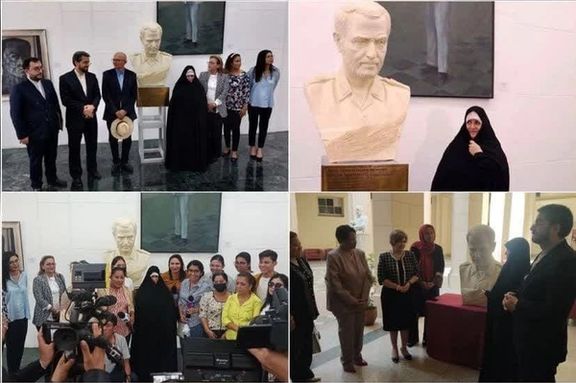
As part of the regime’s propaganda, two busts of the former IRGC Quds Force Commander Qasem Soleimani were erected in Cuba and Nicaragua.

As part of the regime’s propaganda, two busts of the former IRGC Quds Force Commander Qasem Soleimani were erected in Cuba and Nicaragua.
During the recent trip of Ebrahim Raisi to Latin America, two figurines of Soleimani were unveiled by the wife of the President of the Islamic Republic of Iran, Jamileh Alamolhoda, in the two countries, Tasnim News Agency reported Thursday.
On January 3, 2020, the US military, on the order of President Donald Trump, killed Soleimani in a drone strike near Baghdad International Airport, saying that he had been "actively developing plans to attack American diplomats and service members in Iraq and throughout the region."
One of the busts was placed in the Hall of Heroes of Nicaragua in the presence of the Ministers of Culture, Family and Science, and another one the University of Havana with the Head of the Communist Party of Cuba and the Dean of the University of Havana attending the ceremony.
“Soleimani was a man of action and a hero in the fight against terrorism for the women of the region and a harbinger of security for the whole world,” said Alamolhoda on the sidelines of the ceremony.
On Saturday, Saudi Arabia's Foreign Minister Prince Faisal bin Farhan refused to hold a joint presser in Iran under Qassem Soleimani’s picture and the presser was relocated.
The Qods Force under Soleimani became deeply involved in the conflicts in Syria and Iraq, setting up militant proxy militias.
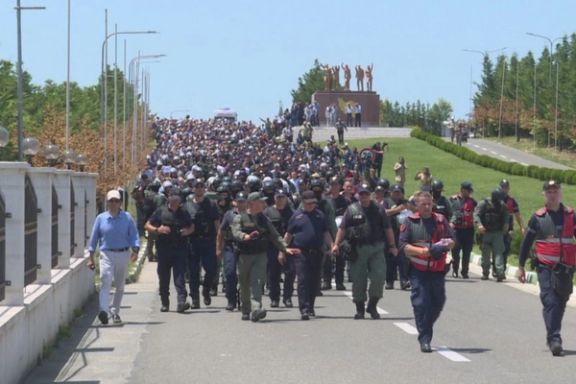
A collective of Iranian republican opposition groups has called for a probe into the Albanian police raid on Mojahedin-e-Khalq's exile center, Camp Ashraf.
The statement from the Union for Secular Republic and Human Rights in Iran, demanded that Western countries not ignore the standards of human rights in their dealings with the Islamic Republic.
The statement came two days after opposition group Mojahedin-e-Khalq (MEK) said hundreds of Albanian police officers raided their compound known as Ashraf-3, near Manze, a small hill town some 30km west of Albania’s capital Tirana.
The opposition coalition expressed concerns about the possible cooperation of European countries with the Islamic Republic in exchange for concessions from the regime, saying that the attack on the MEK’s township is in line with Iran’s intensified efforts to stifle voices of dissent inside the country and abroad.
The group said this trend is proven by the prisoner swap between Iran and Belgium that led to the release of Iranian diplomat convicted of terrorism Assadollah Assadi in exchange for four European nationals held hostage by the regime.
“The free world cannot contribute to the spread of democracy in the world by ignoring the freedoms and rights of citizens within its own territory, even on the pretext of security concerns,” the group's statement urged, seeking the formation of a fact-finding committee to investigate the incident.
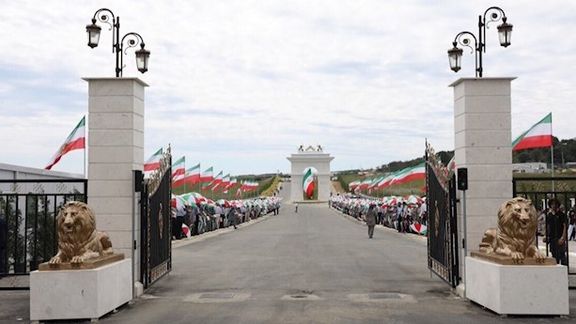
Reports about the circumstances of the incident at Camp Ashraf are full of conflicting recounts with the Albanian authorities blaming the MEK members for the clashes and the MEK accusing Albania of giving in to the whims of the Islamic Republic. Iranian Foreign Ministry Spokesperson Nasser Kanani said on Wednesday that the cult – as the regime calls the MEK -- is and will be a danger for its host country “due to its terrorist nature.”
The regime alleges that since the establishment of the Islamic Republic in 1979, the group has carried out numerous terrorist attacks against Iranian officials and civilians, killing some 17,000 people.
Also on Wednesday, Iran's vice president for legal affairs, Mohammad Dehghan, said legal measures are underway in coordination with the ministries of intelligence and foreign affairs as well as the judiciary to return “the hypocrites” to Iran. Iranian officials always refer to the exiled MEK with an Arabic term (munafiqin) that means 'hypocrites.'
“We must issue sentences for people who committed crimes against people or state property inside the country and enforce these verdicts abroad," he said.
Albania says the police were following a lead as part of an investigation over cyberattacks against the Albanian government, but the residents of the camp resisted the forces, and scuffles broke out.
The group said on Tuesday that one of their members, identified as Ali Mostashari, was killed and more than a hundred others injured, with some hospitalized in critical condition after police raided the camp using tear gas and pepper spray.
Albanian Interior Minister Bledi Cuci and the head of the national police, Muhamet Rrumbullaku, said 36 people – 15 police officers and 21 MEK members -- were injured during the raid, emphasizing that the death was not caused by any police action. Police denied any wrongdoing.
Albanian prosecutors have also charged six members of the MEK following the clashes for offenses related to the violation and destruction of police vehicles, disobeying police and court orders, as well as assault and battery of on-duty police officers. In a statement released on Thursday, the National Council of Resistance of Iran (NCRI) claimed that these six people – without identifying them – were the ones cooperating with the police and were trying to calm the situation.
Evidence revealed the MEK was informed beforehand about the police check, as was claimed by the Albanian authorities. However, according to the statement, the police showed up at the camp with 150 cars and over 1,200 forces. It added that after entering the camp, the police stationed machine guns on top of the buildings.
In a joint conference after the raid, Cuci and Rrumbullaku said that about 100 computers were seized during their searches as well as documents which, at the time of the operation, the MEK members tried to burn. The police released drone footage of MEK members moving big black bags of what they say were documents to an outdoor fireplace and trying to burn them.
Confirming some of the accounts in the NCRI statement, they said that they had a meeting with the six main leaders of the camp and were promised full cooperation. However, they said the resistance began after about two hours of search when the police found out about the MEK members' efforts not to declare server rooms and computer equipment in almost 17 facilities.
Following the incident, the US State Department released a statement, saying that it has been "assured" the Albanian government did not violate any human rights. Raising concerns about the group’s actions against its own members, including allegations of abuse, the statement emphasized that Washington does not view the MEK as “a viable democratic opposition movement that is representative of the Iranian people.”
In September 2022, Albania severed its relations with the Islamic Republic and expelled all Iranian diplomats and embassy staff following an investigation into a large-scale cyberattack that targeted the country’s infrastructure in July. The attack happened around the time of a conference held by the MEK.
The Tuesday attack against the de facto headquarters of the MEK took place about a month after the MEK-affiliated hacktivist group Uprising till Overthrow breached into 120 servers of the Iranian presidential office, getting access to internal communications, meetings minutes, and leaking troves of confidential data.
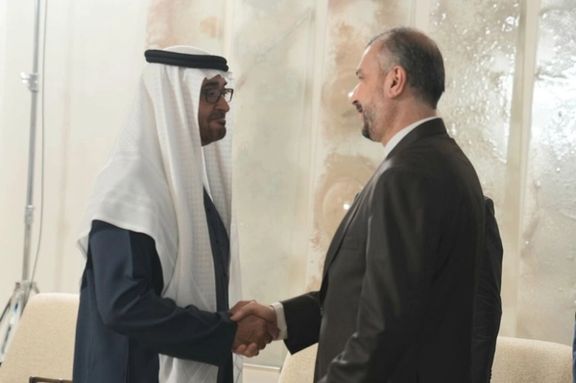
The Iranian foreign minister has invited Sheikh Mohamed bin Zayed, the president of the United Arab Emirates, to Tehran.
Hossein Amir-Abdollahian presented bin Zayed with the invitation on behalf of Iranian President Ebrahim Raisi on Thursday.
The Iranian top diplomat arrived in Abu Dhabi on the fourth and final leg of his regional tour.
Among the topics discussed were consular, cultural, economic, and political relations between Iran and the UAE.
Amir-Abdollahian visited Qatar, Oman, and Kuwait before traveling to the UAE.
Meanwhile, his deputy for political issues met with Legal Advisor to Qatari Foreign Minister, Mohammad AlKhulaifi in Doha Wednesday night.
Ali Bagheri-Kani called lasting peace and stability dependent on development and progress in the countries of the region.
“The peace and stability that does not lead to development and progress is temporary, unstable,” he noted.
Referring to the progressing relations between the two countries, AlKhulaifi said “Iran and Qatar are always partners in bringing peace and stability to the region.”
Recent restoration of diplomatic ties between Saudi Arabia and Iran signaled a new policy by the Persian Gulf Sunni Arab states for closer regional ties.
A deal brokered by China in March ended a diplomatic rift between Iran and Saudi Arabia, and re-established relations following years of hostility.
In 2016, protesters attacked the Saudi embassy in Tehran in retaliation for Riyadh's execution of a prominent Shiite cleric, which led to Riyadh severing its ties with Tehran.
The UAE and Bahrain quickly followed Saudi Arabia in severing diplomatic relations with Iran.

As more signs show renewed contacts between Iran and the West, a bipartisan group of 26 US senators have asked President Joe Biden not to rush into a bad agreement.
The senators expressed their concern over reports that the administration is trying to reach a limited nuclear deal with Iran, which it apparently intends to keep out of the US Congress by not signing a formal document.
“It is crucial for your administration to remain aligned with Congressional efforts related to Iran’s nuclear program and not agree to a pact that fails to achieve our nation’s critical interests,” the letter said.
The Jewish Insider reported that the bipartisan coalition was formed and the text drafted before recent revelations of talks with Iran, but it now has assumed new significance.
The letter was led by Sens. Kirsten Gillibrand (D-NY) and James Lankford (R-OK), but there are several Democratic senators who previously supported the 2015 JCPOA nuclear deal.
While the Biden administration has not denied regular direct and indirect contacts with Iran, diplomatic activities picked up speed this week as Iran’s foreign minister Hossein Amir-Abdollahian visited Qatar and Oman, traditional mediators between Washington and Tehran. Iran’s chief nuclear negotiator Ali Bagheri-Kani also met with the European Union’s negotiator Enrique Mora in Qatar.
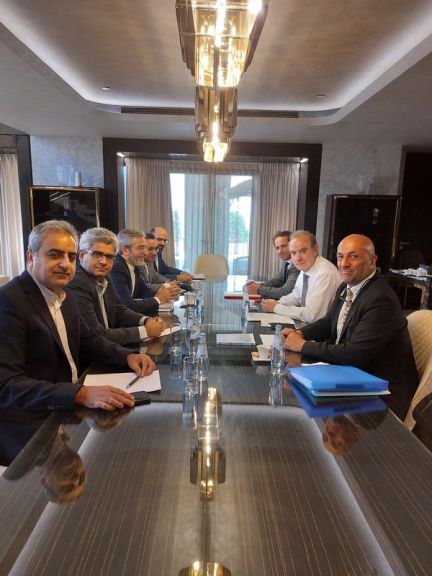
“We exchanged views and discussed a range of issues including negotiations on sanctions lifting,” Bagheri-Kani tweeted after the meeting. The Iranian régime calls the negotiations talks to lift sanctions, not to a nuclear deal.
“It is imperative today that we strengthen our efforts to deter Iran from achieving nuclear weapons capability. We must make Iran understand, in no uncertain terms, that further advances in its nuclear program will be met with unified international action,” the 26 senators wrote to Biden.
US lawmakers have repeatedly complained about the Biden administration’s lax sanctions enforcement against Iran, especially with China steadily increasing imports of embargoed Iranian oil.
Since Biden’s election in 2020, Iran’s daily oil exports have jumped from 250,000 barrels per day to nearly 1.5 million, mostly going to China through illicit methods.
“Iran simply cannot be allowed to advance its nuclear program with impunity and the PRC cannot be given a pass for accelerating Iran’s destabilizing behavior. We urge you to restore this posture of deterrence and provide leadership to strengthen the resolve of the international community,” the letter said.
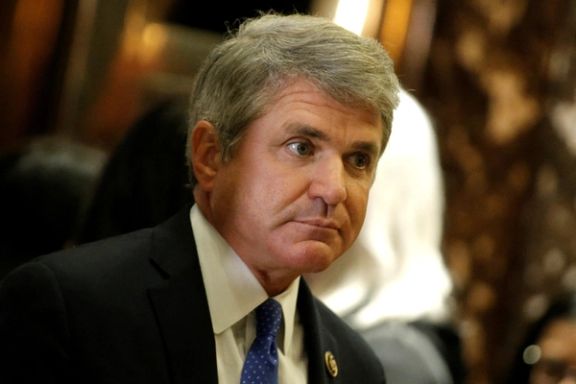
Last week House Foreign Affairs Committee Chairman Rep. Michael McCaul also sent a letter to President Joe Biden saying, “I am disturbed by recent revelations that the Administration has re-engaged in ‘proximity talks’ with the Iranian regime, and that the results of these discussions have included the apparent greenlighting of sizable payments to Iran.“
He was referring to the White House allowing Iraq to release more the $2.7 billion in Iran’s frozen funds earlier this month.
McCaul urged Biden to respect the Iran Nuclear Agreement Review Act of 2015 (INARA), which was enacted during the finalization of the Joint Comprehensive Plan of Action (JCPOA) in 2015 to allow Congress to oversee dealings with Tehran. The Obama administration decided not to make the JCPOA nuclear deal a treaty, given opposition in Congress at the time and agreed to INARA to neutralize opposition among lawmakers.
„We urge you to take meaningful steps to curb Iran’s destabilizing activities and deter the regime from pursuing this nefarious ambition any further,“ the senators told President Biden.
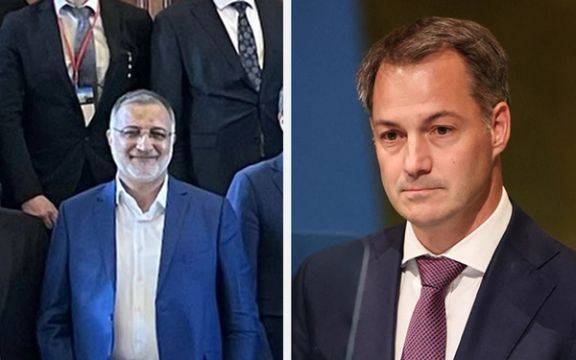
Belgian lawmakers Wednesday questioned PM Alexander De Croo and Foreign Minister Hadja Lahbib for allowing officials from Iran and Russia to attend a mayors' convention in Brussels last week.
Lahbib especially is under scrutiny for having approved visas requests while Iran and Russia are under international sanctions and only three weeks after Belgian NGO worker Olivier Vandecasteele was released from an Iranian jail. He was exchanged in a controversial move with a former Iranian diplomat convicted in a Belgian court of leading a terror plot in Europe and serving a long prison sentence.
De Croo and Lahbib said they didn't want to risk a diplomatic row with Iran close to the release of Vandecasteele and three other Europeans, but lawmakers from opposition as well as coalition parties contest that reasoning.
When in Brussels, the Iranian delegation filmed Belgo-Iranian lawmaker Darya Safai and Iranian opposition members, Belgian national broadcaster RTBF reported.
Safai, who was a prominent activist in Iran before fleeing to Belgium in 2000, said she no longer felt safe in Belgium.
Tehran' mayor, Alireza Zakani, is known as a hardline Iranian politician, who was a member of the Revolutionary Guard’s Basij militia.
The opposition has called for Lahbib's resignation, while extreme-right opposition party Vlaams Belang also asked for De Croo's resignation.
State secretary for external relations of the Brussels government Pascal Smet resigned on Sunday over the all-expenses paid trip.
Reporting by Reuters
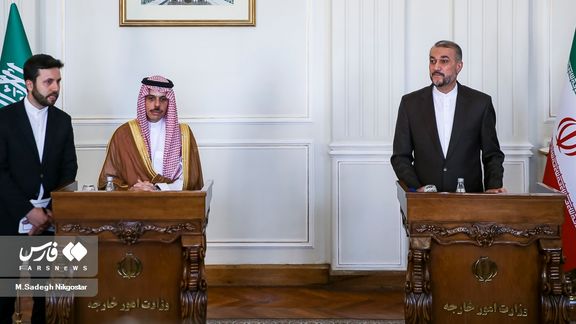
Heated debates in Iran continue about Tehran's ties with Riyadh following an incident during the recent visit of Saudi Foreign Minister Prince Faisal bin Farhan.
The controversy ensued when at the conclusion of talks between bin Farhan and his Iranian counterpart on June 17, the venue of their joint press conference was suddenly changed.
While the Iranian foreign ministry spokesman and the state television insisted that changing the room was "due to a technical problem," Iranian reporters on social media insisted that the Saudi delegation refused to sit in a room where a big portrait of former IRGC Qods Force Commander Qassem Soleimani was posted on the wall.
Foreign policy analyst Diako Hosseini wrote in a tweet: "The Foreign Ministry should have been intelligent enough to predict the Saudis' sensitivities. Now that the ministry was not intelligent enough, the minister should have cancelled the news conference."
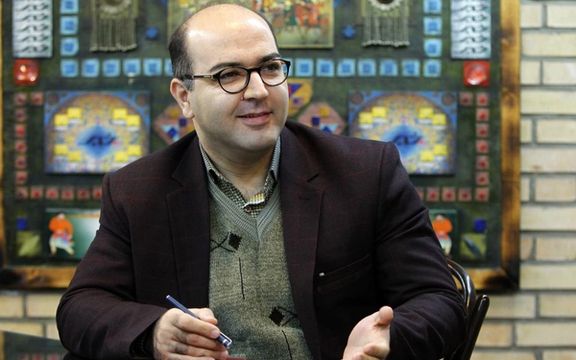
An Iranian commentator in Paris, Mohammad Javad Akbarin tweeted: "In 2019 Soleimani wanted to bring Syrian Leader Bashar Assad to a meeting with Supreme Leader Ali Khamenei to attract media attention. Instead, it was [foreign minister] Zarif's threat to resign that became the day's news. Now, the general's picture has undermined all the achievements of the visit by the Saudi delegation. Dead or alive, Soleimani has always brought about a loss for the country's diplomacy and national interests."
Zarif was apparently caught off guard when Assad showed up in Tehran and was not even invited to the meeting with Khamenei.
At the same time, prominent Saudi columnist Mohammed Alsulami wrote in a series of tweets in both Arabic Persian that "Trust between the two countries is fragile and comments made by some political figures close to Iran shows how difficult is rebuilding mutual trust." He further called on Iranians to avoid using sarcastic language about the Iran-Saudi ties as the Saudis are not interested in “factional rivalries in Iran.”
At the same time, foreign policy analyst Ali Bigdeli told Nameh News website in Tehran that "Not all the problems between Tehran and Riyadh will be solved with a visit to Tehran by bin Farhan. He added that "Some Iranian officials have said that America’s hands will be cut off from the Middle east following the agreement between Iran and Saudi Arabia, but this is not true."

He added: "We still do not have full diplomatic relations with Saudi Arabia. The Iranian ambassador to Riyadh has still not received his credentials from the King." He said in another part of his interview that Saudi promises of investing in Iran may not materialize as long as US sanctions against Iran are in place.
Bigdeli argued that Iran should follow a dynamic policy like Saudi Arabia and maintain healthy ties with both East and West rather than pinning all its hopes on the East.
Meanwhile, moderate news website Entekhab wrote in a commentary that two years after President Ebrahim Raisi declared Iran's policy of expanding ties with China, Iran's "looking east policy" has not been as successful as Saudi Arabia's relations with China.
The website wrote that despite signing a 25-year cooperation agreement with China, Iran's share of trade with Beijing only amounted to half a percent of China's international trade in 2022.
Generally, the total trade volume between Iran and China was less than $16 billion while Saudi Arabia maintained an annual trade of $106 billion with China in 2022, Entekhab maintained.